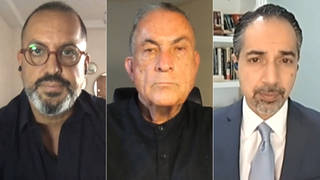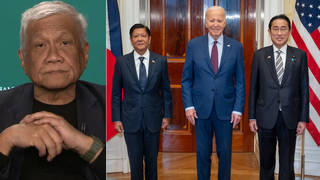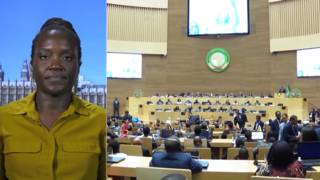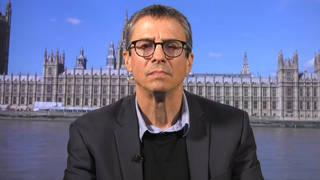
Related
Topics
Guests
- Ray McGovernformer senior CIA analyst whose duties included preparing the President’s Daily Brief and chairing National Intelligence Estimates. His most recent article for Consortiumnews.com is called “Why to Say No to Susan Rice.” He is on the steering group of Veteran Intelligence Professionals for Sanity (VIPS).
We look at the ongoing debate surrounding the potential appointment of U.S. Ambassador to the United Nations Susan Rice as the successor to Secretary of State Hillary Clinton. For weeks, Republicans have campaigned against Rice, accusing her of misleading the public about the deadly September 11th attack on the U.S. consulate in Benghazi, Libya. We’re joined by Ray McGovern, a former senior CIA analyst who argues Rice’s nomination should be opposed not over Benghazi, but for her record while serving under the Clinton and Obama administrations, as well her financial interests in the proposed Keystone XL oil pipeline. [includes rush transcript]
Transcript
NERMEEN SHAIKH: We turn now to the ongoing debate surrounding the potential appointment of U.S. Ambassador to the United Nations Susan Rice as the successor to Secretary of State Hillary Clinton. For weeks, Republicans have campaigned against Rice, accusing her of misleading the public about the deadly September 11th attack on the U.S. consulate in Benghazi, Libya, earlier this year. Rice initially suggested the attacks were sparked by a video called The Innocence of Muslims, which portrayed Islam in a negative light and led to protests across the Middle East. This is Ambassador Rice speaking on ABC’s This Week, on the Sunday following the attack.
AMBASSADOR SUSAN RICE: Our current best assessment, based on the information that we have at present, is that, in fact, what this began as was a spontaneous, not a premeditated, response to what had transpired in Cairo. In Cairo, as you know, a few hours earlier, there was a violent protest that was undertaken in reaction to this very offensive video that was disseminated.
NERMEEN SHAIKH: Late last month, Rice met with three of her top critics in a bid to settle the claim that she provided false information in the wake of the attacks in Benghazi. After the meeting, the three Republican senators appeared to harden their opposition to her nomination as secretary of state. Senators Lindsey Graham of South Carolina and Kelly Ayotte of New Hampshire vowed to block Rice’s appointment as secretary of state, while Arizona Senator John McCain told reporters he was still concerned about Rice’s early explanation of the Libya attacks.
SEN. JOHN McCAIN: It is clear that the information that she gave the American people was incorrect when she said that it was a spontaneous demonstration triggered by a hateful video. It was not, and there was compelling evidence at the time that that was certainly not the case, including statements by Libyans as well as other Americans who are fully aware that people don’t bring mortars and rocket-propelled grenades to spontaneous demonstrations.
AMY GOODMAN: In response to the initial criticism by Republican members of Congress, President Obama defended Susan Rice and issued a challenge to her detractors.
PRESIDENT BARACK OBAMA: If Senator McCain and Senator Graham and others want to go after somebody, they should go after me. And I’m happy to have that discussion with them. But for them to go after the U.N. ambassador, who had nothing to do with Benghazi and was simply making a presentation based on intelligence that she had received, and to besmirch her reputation, is outrageous.
AMY GOODMAN: To talk more about Ambassador Rice as potential secretary of state, we go to Raleigh, North Carolina, where we’re joined by Ray McGovern, former senior CIA analyst whose duties included preparing the President’s Daily Brief and chairing National Intelligence Estimates for President George H. W. Bush. His most recent piece for Consortiumnews.com is called “Why to Say No to Susan Rice.” He’s on the steering group of Veteran Intelligence Professionals for Sanity.
Ray McGovern, welcome to Democracy Now! Do you think the Benghazi issue is the key issue here for whether or not Susan Rice is qualified to be secretary of state?
RAY McGOVERN: It’s not at all the key issue. It’s really a smoke screen. She should be judged on her merits, on things that she—that are on the record about her behavior with respect to diplomacy. She was assistant secretary of state for African affairs and also the Africa reference in Bill Clinton’s White House when the genocide, the genocide in Rwanda, happened. She was unwilling to call it “genocide,” because her boss told her not to call it “genocide,” because—
AMY GOODMAN: Her boss being?
RAY McGOVERN: —there’d be consequences there.
AMY GOODMAN: Her boss being?
RAY McGOVERN: Bill Clinton. She worked for Clinton in the National Security Council of the White House at that time, and then she became later, a couple years later, assistant secretary for African affairs.
Now, more recently, you know, we talked about 800,000 people being killed in Rwanda. Well, how about three million people being killed in the Congo over the last decade? And she’s been very reluctant to criticize the major supporter of the terrorists there, Kagame of Rwanda. And it turns out, just recently, that he happens to have been one of her major clients when she did a tour as a consultant between her tenures in office. So, you know, there are conflicts of interest here. There is a record of really a disregard for the, ironically enough, the people in Africa.
When the French consul—the French ambassador at the U.N. tried to get Kagame criticized, and perhaps sanctions considered against him, she said, “Look, don’t you—don’t you recognize? This is the Democratic Republic of Congo. If it wouldn’t be these terrorists, it would be other terrorists.” Well, hello. It sounds like her—one of her mentors, Madeleine Albright, who famously said about sanctions against Iraq that when 500,000 children under the age of five perished—like, died—well, that was worth it; or maybe her patron, Hillary Clinton, who famously cackled when Muammar Gaddafi suffered a gruesome death. She said, “We came, we saw, and he died.” Well, that’s not the kind of attitude you need in a secretary of state. You need somebody who has credentials, a good credential of having supported people who are oppressed.
NERMEEN SHAIKH: Ray McGovern, I want to go to a clip of Democratic Congressmember Marcia Fudge of Ohio. She’s the chair of the Congressional Black Caucus. She was speaking last month during a news conference about the attacks against Ambassador Susan Rice.
REP. MARCIA FUDGE: They have never called a male “unqualified,” “not bright,” “not trustworthy.” I don’t recall it ever happening. They didn’t even say that about General Petraeus, who they’re all up in arms about. So, there is a clear—in my opinion, a clear sexism and racism that goes with these comments that are being made by, unfortunately, Senator McCain and others. And I strongly stand by that statement.
NERMEEN SHAIKH: Ray McGovern, that was Ohio Democratic Congressmember Marcia Fudge. Your response to what she said accounts for the criticism of Susan Rice?
RAY McGOVERN: I say look at her record. Look at her record. And look at the prospects. Now, if she became secretary of state, it would be up to her to rule on whether the Keystone XL pipeline would go through. Now, she and her husband hold several million dollars’ worth of stock in Canadian oil companies, Canadian banks, who are going to profit immensely from that if it’s approved. She said nothing about being—recusing herself. So, you know, it’s the kind of thing where this is—as you reported from Doha, I mean, this is transcendental. This is—it dwarfs everything else in significance. I’m here in Raleigh visiting two of my grandchildren. I don’t want them to have to suffer the effects of what would happen if the XL pipeline goes through. And it would be up to her, or someone designated by her—of course, not beholden to her. Give me a break. So that’s a trans—an important issue that has been sort of dismissed. It would be up to her. She’s not qualified. She’s not entitled to that. She has, again, a conflict of interest in that kind of decision.
AMY GOODMAN: Ambassador Susan Rice is also coming under increasing criticism for her dealings with many African leaders. A former colleague of Ambassador Rice at the Brookings Institute, Michael O’Hanlon, expressed harsh criticism of a New York Times op-ed which appeared earlier this week titled “Susan Rice and Africa’s Despots,” which suggested that Rice has had close associations with dictators across the continent. O’Hanlon was speaking on MSNBC’s Andrea Mitchell.
MICHAEL O’HANLON: The specific thing I would contribute today on this topic is to object to the argument that was made in the New York Times op-ed page this morning by an Eritrean activist, who suggested that Susan Rice has been too friendly to various African strongmen. And the op-ed piece did not resonate very well with me at first, but I went in and did a little more research to go through the list of the people that this author listed as people that Rice had supported too much. And they happen to have run five of the dozen or 15 best countries in Africa over the last decade in terms of their economic performance and their internal stability. It doesn’t mean that everything’s perfect, obviously. And I’m sure Ambassador Rice wouldn’t suggest that everything’s perfect in countries like Uganda and Rwanda and Ethiopia and South Africa, but nonetheless there’s been progress in all of these places. And we sometimes had to work with people who weren’t perfect. But this author made it sound as if she was somehow guilty by association with anything they did wrong and somehow had picked the wrong people to try to work with. I thought it was an absurd argument, and it sort of contributes to the same tone we’ve been hearing the last few weeks.
AMY GOODMAN: That’s Michael O’Hanlon of Brookings, speaking on MSNBC. Your response, Ray McGovern, and also to the issue of—she is carrying out the orders of her bosses, I mean, whether we’re talking about Hillary Clinton as secretary of state or, before that, President Clinton?
RAY McGOVERN: Well, that’s true. But she also has cabinet status. And were she to become secretary of state, she would have an active hand in policymaking. She probably already does. So it’s not sufficient to say she’ll simply do what she’s told, although she has a great record for that.
Let me explain—let me respond to O’Hanlon. You know, I go—I go with the professors, the people who really know what’s going on in the Congo, which, most people will remember, has more natural resources than almost any other country in the world. What’s going on in the condo? Well, Kagame, her former client, the head of Rwanda, is fomenting terrorism there. And what Howard French, a professor at Columbia, said is that Ambassador Rice holds the distinction of forwarding or making sure that people advance the most—the worst dictators in Africa. And so, that’s her record. That’s what we go with. And when I said three million, three million people killed in the Congo over the last decade, well, that’s a real figure. Even Helene Cooper in the New York Times said that two days ago. So those are—that’s her record.
And the business about her—the sexism charge, I don’t think it really holds up to the light of day. The racism charge, well, you know, when you had Lindsey Graham there, facing a primary challenge pretty soon, and he’s from the state of North Carolina, well, I can imagine—
AMY GOODMAN: South Carolina.
RAY McGOVERN: —that Lindsey Graham’s posture on her—South Carolina, sorry—that Lindsey Graham’s posture on this might be seen by him as a very good thing for his political prospects in South Carolina. The sexism thing doesn’t hold. Look, we’ve had Madeleine Albright—
AMY GOODMAN: We have five seconds, Ray.
RAY McGOVERN: —five hundred thousand children killed, and we have Hillary Clinton, who cackles when dictators are murdered.
AMY GOODMAN: We have to leave it there. I want to thank you for being with us, Ray McGovern, former senior CIA analyst.












Media Options